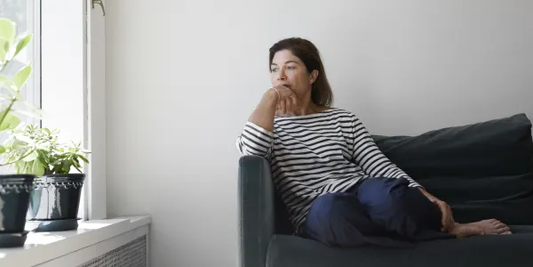
Why You Get Menstrual Cramps – and What You Can Do About It
Share
For some, menstrual cramps are barely noticeable, while others experience them so intensely that they need to take time off work. Menstrual pain is something that most women experience for a large part of their lives. Here, we share some tips on how to ease the pain.
We are all different, and our bodies react in different ways, especially when it comes to menstruation and cramps. Some women struggle with severe menstrual pain, while others barely notice it at all.
What Causes Menstrual Pain?
During menstruation, the uterus contracts to expel the lining, which is what we see as the period. There are many nerves around the uterus that are affected by its contractions. This means that the pain may not only occur in the stomach but also in the back, groin, and thighs.
Certain hormones, especially prostaglandins, are also involved. These hormones influence how much menstrual pain you feel and are released when the uterus expels the lining. This explains why the pain level can vary – even from one cycle to the next.
If menstrual pain coincides with stress, poor sleep, or inadequate nutrition, it may be harder to manage the discomfort compared to when you are rested and feeling good overall. So, it’s a good idea to take extra care of yourself in the days leading up to your period.
You shouldn’t have to suffer unnecessarily; there are several ways to alleviate, or at least reduce, the pain. But symptoms vary from person to person. Some experience mild, dull aches, while others have such intense pain that they feel like they might faint. If your discomfort is severe, always consult a midwife or gynecologist for advice on how to manage your pain.
Different Types of Pain Relief for Menstrual Cramps
When it comes to relieving menstrual pain, both over-the-counter painkillers and heat pads, gentle walks, yoga, or perhaps a warm shower can help. Most people feel the strongest symptoms in the first few days, so it's usually enough to use painkillers during this initial phase. You typically shouldn’t need to take them for the entire cycle.Using Painkillers
It can be difficult to know which type of over-the-counter pain reliever to choose. We spoke with Mia Johansson, a licensed pharmacist, for her recommendation.
“For pain relief, an anti-inflammatory drug is usually the best option. Personally, I often recommend naproxen, as it has a longer-lasting effect than ibuprofen. However, you should avoid anti-inflammatory medications if you are taking certain blood pressure medications, have heart problems, asthma, or stomach ulcers. In such cases, paracetamol is a better alternative,” says Mia.
Using Natural Remedies
When it comes to relieving menstrual pain, many women find that natural methods can be highly effective. Using heat pads, going for gentle walks, doing yoga, or even taking a warm shower can all help ease discomfort. Another excellent option is herbal teas, which can be a soothing and natural way to reduce cramps.
Koola Herbals offers a variety of herbal teas specifically designed to help ease menstrual discomfort. Our teas, made with natural ingredients that are known to help relax muscles, reduce inflammation, and improve blood flow. Drinking these teas regularly in the days leading up to your period can support your body and make your cycle more manageable.
Warm Your Stomach or Back
Menstrual pain can often feel less intense if you apply heat to the painful areas, such as your stomach or back. Fill a hot water bottle or take a warm shower and aim the showerhead at your abdomen. A warm wheat bag can also feel soothing when placed on the stomach.Movement
Exercising might be the last thing you want to do when you're curled up on the couch, but if possible, try to move around. This could be anything from a brisk walk to a sweaty gym session. Movement can help relieve uterine cramps. If moving around feels difficult, try a light yoga session at home – all you need is a yoga mat.Contraceptives and Menstruation
Birth control can affect your menstrual cycle and how you feel. Some people experience positive effects on their periods and cycles when using contraceptives, while others experience the opposite. Consult a doctor or midwife for advice.
“Today, there are many different types of contraceptives to choose from. Those containing sex hormones reduce bleeding and make periods less painful, and in some cases, menstruation may stop altogether,” says Mia.
Contact Healthcare for Help If:
- Over-the-counter painkillers or natural remedies do not help.
- You experience intense pain and difficulty moving.
- You suddenly develop menstrual cramps without having had them before.



